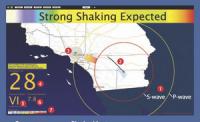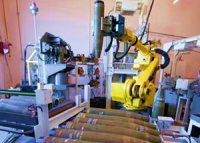-
Long-distance earthquake detection
In traditional seismology, researchers studying how the earth moves in the moments before, during, and after an earthquake rely on sensors that cost tens of thousands of dollars to make and install underground. Now researchers have figured out a way to overcome these hurdles by turning parts of a 13,000-mile-long testbed of “dark fiber,” unused fiber-optic cable, owned by the DOE Energy Sciences Network (ESnet), into a highly sensitive seismic activity sensor that could potentially augment the performance of earthquake early warning systems currently being developed in the western United States.
-
-
Deradicalization and countering violent extremism

Since the early 2000s, more than fifty countries have developed initiatives to counter violent extremism (CVE). Despite this, there still remains a lack of strong evidence on which interventions are effective. Researchers have reviewed the literature on CVE programs to give examples of what good CVE practice should look like.
-
-
Violent video games not associated with adolescent aggression: Study

Researchers have found no relationship between aggressive behavior in teenagers and the amount of time spent playing violent video games. “The idea that violent video games drive real-world aggression is a popular one, but it hasn’t tested very well over time,” says lead researcher Professor Andrew Przybylski, Director of Research at the Oxford Internet Institute. “Despite interest in the topic by parents and policy-makers, the research has not demonstrated that there is cause for concern.”
-
-
“It eats everything” – the new breed of wildfire that’s impossible to predict

Climate change and negligent forest management are causing higher-intensity, faster-moving fires that can generate enough energy to evolve into erratic firestorms, known as pyroCbs, in the face of which first responders can do little.
-
-
L.A. showcases quake alert system

California is earthquake country, and residents of Los Angeles can now get some critical warning, when conditions are right, after a quake has started and seismic waves are heading their way. The long-delayed system, called ShakeAlertLA, is the first of its kind in the United States.
-
-
700,000 submunitions demilitarized by Sandia-designed robotics system

More than 700,000 Multiple Launch Rocket System submunitions have been demilitarized since the Army started using an automated nine-robot system conceptualized, built and programmed by Sandia Lab engineers. The automated system was built for the Army’s demilitarization program that aims to dismantle obsolete ammunition and missiles.
-
-
Marine organisms as detectors of enemy undersea activity
Goliath grouper, black sea bass, and snapping shrimp, along with bioluminescent plankton and other microorganisms, are set to be the unlikely additions to protecting U.S. assets. Researchers are developing new types of sensor systems that detect and record the behaviors of these marine organisms and interpret them to identify, characterize, and report on the presence of manned and unmanned underwater vehicles operating in strategic waters. The incorporation of biological signals will extend the range, lifetime, and performance of undersea surveillance technologies in strategic waters.
-
-
Expanding cybersecurity education to fill job market shortfall
Experts say that the U.S. cyber workforce shortfall is growing. By the 2022, the shortage of cybersecurity professionals is predicted to be 1.8 million. Colleges and universities expand their cybersecurity education offerings.
-
-
Putting data privacy in the hands of users
In today’s world of cloud computing, users of mobile apps and web services store personal data on remote data center servers. Services often aggregate multiple users’ data across servers to gain insights on, say, consumer shopping patterns to help recommend new items to specific users, or may share data with advertisers. Traditionally, however, users haven’t had the power to restrict how their data are processed and shared. New platform acts as a gatekeeper to ensure web services adhere to a user’s custom data restrictions.
-
-
New layer of medical preparedness to combat emerging infectious disease
Researchers supporting the PREventing EMerging Pathogenic Threats PREEMPT program will model viral evolution in animal populations, quantify the probability of human pathogen emergence, and pursue proof-of-concept interventions to prevent viral spread to humans.
-
-
Next-generation grid security tech
Researchers will demonstrate the effectiveness of metro-scale quantum key distribution (QKD) as a means of secure communication for the nation’s electricity suppliers. This initial milestone is part of the team’s three-year project focused on next-generation grid security.
-
-
Don’t be fooled by fake images and videos online

Advances in artificial intelligence have made it easier to create compelling and sophisticated fake images, videos and audio recordings. Meanwhile, misinformation proliferates on social media, and a polarized public may have become accustomed to being fed news that conforms to their worldview. All contribute to a climate in which it is increasingly more difficult to believe what you see and hear online. There are some things that you can do to protect yourself from falling for a hoax. As the author of the upcoming book Fake Photos, to be published in August, I’d like to offer a few tips to protect yourself from falling for a hoax.
-
-
Gain-of-function (GoF) research set to resume, and unease grows

Gain-of-function (GoF) research involving H5N1 is set to resume – but without review comments, as the review panel has kept mum. Many scientists are worried, arguing that certain studies that aim to make pathogens more potent or more likely to spread in mammals are so risky they should be limited or even banned.
-
-
Climate change increases potential for conflict, violence

Images of extensive flooding or fire-ravaged communities help us see how climate change is accelerating the severity of natural disasters. The devastation is obvious, but what is not as clear is the indirect effect of these disasters, or more generally of rapid climate change, on violence and aggression.
-
-
And now, land may be sinking
In the coming decades, cities and towns up and down the eastern seaboard will have to come to terms with the impact of rising sea level due to climate change. A new study, however, is suggesting that rising sea levels may be only part of the picture — because the land along the coast is also sinking.
-
More headlines
The long view
The Future of Open Data in the Age of AI: Safeguarding Public Assets Amid Growing Private Sector Demands
AI offers immense potential, but that potential must be realized within a framework that protects the public’s right to its own information. The open data movement must evolve to meet this new challenge—not retreat from it.
Horses for Courses: Where Quantum Computing Is, and Isn’t, the Answer
Despite the impressive and undeniable strides quantum computing has made in recent years, it’s important to remain cautious about sweeping claims regarding its transformative potential.
Federal R&D Funding Boosts Productivity for the Whole Economy − Making Big Cuts to Such Government Spending Unwise
Large cuts to government-funded research and development can endanger American innovation – and the vital productivity gains it supports. If the government were to abandon its long-standing practice of investing in R&D, it would significantly slow the pace of U.S. innovation and economic growth.
Why Ukraine’s AI Drones Aren’t a Breakthrough Yet
Machine vision, a form of AI, allows drones to identify and strike targets autonomously. The drones can’t be jammed, and they don’t need continuous monitoring by operators. Despite early hopes, the technology has not yet become a game-changing feature of Ukraine’s battlefield drones. But its time will come.
New Tech Will Make Our Airplanes Safer
Odysight.ai’s technology allows for constant monitoring of aircraft, sending alerts in case of malfunctions that could lead to accidents.
New Technology is Keeping the Skies Safe
DHS S&T Baggage, Cargo, and People Screening (BCP) Program develops state-of-the-art screening solutions to help secure airspace, communities, and borders
